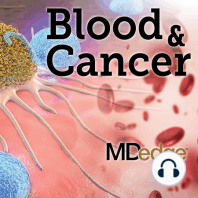25 min listen

Optimizing CAR T-cell therapies in lymphoma: Improving response, fighting cytokine release syndrome, and identifying mechanisms of resistance
FromBlood & Cancer
Optimizing CAR T-cell therapies in lymphoma: Improving response, fighting cytokine release syndrome, and identifying mechanisms of resistance
FromBlood & Cancer
ratings:
Length:
26 minutes
Released:
Apr 15, 2021
Format:
Podcast episode
Description
Studies have shown that chimeric antigen receptor (CAR) T-cell therapies produce responses in patients with relapsed/refractory B-cell lymphomas, but researchers continue to look for ways to improve efficacy, decrease toxicity, and overcome treatment resistance. Leslie Kean, MD, PhD, of Boston Children’s Hospital, discusses some of this research with host David H. Henry, MD, in this episode. Dr. Kean outlines four recent studies of CAR T-cell therapies in lymphoma. The studies were selected as part of the “Best of ASH” session at the 2020 annual meeting of the American Society of Hematology. Primary Analysis of ZUMA-5: A Phase 2 Study of Axicabtagene Ciloleucel (Axi-Cel) in Patients with Relapsed/Refractory Indolent Non-Hodgkin Lymphoma This study was designed to assess the efficacy and safety of axicabtagene ciloleucel (axi-cel) in patients with indolent lymphomas. In follicular lymphoma, the overall response rate (ORR) was 94%, and the complete response (CR) rate was 80%. In marginal zone lymphoma, the ORR was 85%, and the CR rate was 60%. There was one grade 5 and one grade 4 case of cytokine release syndrome (CRS). Dr. Kean noted that 146 patients were evaluable for adverse events, so the single death related to CRS should be viewed in that context. Overall, 82% of patients had CRS of any grade. Jacobson C et al. ASH 2020, Abstract 700. https://bit.ly/32at91V. What’s involved in a CAR T-cell study? Dr. Kean explained that a patient is first deemed eligible by an oncologist and then enrolled in a CAR T-cell study. For studies like ZUMA-5 that are testing autologous CAR T cells, basic lab work is done to ensure the patient has a high enough lymphocyte count. The patient then undergoes apheresis, and the patient’s T cells are used to create the CAR T-cell product. The company developing the product transduces the T cells with the CAR so the resulting CAR T cells will target cancer cells. The therapy in ZUMA-5, axi-cel, targets CD19, which is expressed on B-cell lymphoma cells. Normal B cells express CD19 as well, so immunoglobulin replacement is sometimes necessary to offset the loss of normal B cells. Efficacy and Safety of Tisagenlecleucel in Adult Patients with Relapsed/Refractory Follicular Lymphoma: Interim Analysis of the Phase 2 ELARA Trial Tisagenlecleucel differs from axi-cel in the signaling domain, though tisagenlecleucel targets CD19 as well, Dr. Kean explained. She noted that tisagenlecleucel is a bit more long-lived than axi-cel. In this trial, tisagenlecleucel produced an ORR of 82% and a CR rate of 65%. There were no cases of grade 3 or higher CRS, which may be attributed to the different signaling domain, Dr. Kean said. Fowler NH et al. ASH 2020, Abstract 1149. https://bit.ly/2OIGjjA. TRANSCEND CLL 004: Phase 1 Cohort of Lisocabtagene Maraleucel (liso-cel) in Combination with Ibrutinib for Patients with Relapsed/Refractory (R/R) Chronic Lymphocytic Leukemia/Small Lymphocytic Lymphoma (CLL/SLL) Patients in this study received the CAR T-cell therapy liso-cel in combination with the BTK inhibitor ibrutinib. The combination increased both efficacy and safety, as ibrutinib assisted in calming down the immune response. There were no grade 5 adverse events and no cases of grade 4 CRS or neurotoxicity. The ORR was 95%, and the CR rate was 63%. There was no difference in response among patients who had or had not received a BTK inhibitor previously, Dr. Kean noted. Wierda WG et al. ASH 2020, Abstract 544. https://bit.ly/3uPuJ5U. CD58 Aberrations Limit Durable Responses to CD19 CAR in Large B Cell Lymphoma Patients Treated with Axicabtagene Ciloleucel But Can Be Overcome Through Novel CAR Engineering Dr. Kean noted that CAR T-cell therapy typically produces a CR in more than 90% of patients within 30 days, but the long-term duration of response is about 50%. With this study, researchers wanted to investigate why a CAR T-cell therapy would fail and determine if any tumor-specific factors affect the duration of
Released:
Apr 15, 2021
Format:
Podcast episode
Titles in the series (100)
Practice-changing research in GI cancer: , of the University of Pennsylvania, Philadelphia, joins Blood & Cancer host , also of the University of Pennsylvania, to review the top three GI cancer trials presented at the 2019 ESMO World Congress on Gastrointestinal Cancer, and how they are... by Blood & Cancer